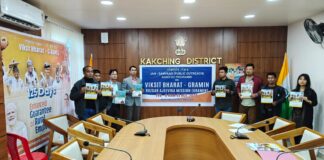Kolkata: Manipal Hospital, Salt Lake, Kolkata the second-largest healthcare provider in India has conducted a senior citizen awareness session on ‘Stroke’ at the hospital premises.
The session was led by Dr. Ansu Sen, Consultant Neurologist, Dr. Kaushik Majumdar Consultant Geriatric-Elderly Medicine and Rabindranath Ghosh Lead Physiotherapist, Manipal Hospital. The participants included a total of 78 members of “Kalinidi Senior Citizen Welfare Association “
Stroke is among those medical emergencies of adult life that ranks first in frequency and importance. It needs immediate medical attention with a wide spread awareness to help save the lives and post stroke complications. Elderly people are at higher risk of stroke in comparison to the younger population and the risk of stroke doubles every ten years after the age of 55.
Stroke can be due to high BP, smoking and alcohol habits, genetics, obesity and with advancing age. Stroke requires immediate treatment and a session on stroke management had helped to cater a large number of people about the symptoms, prevention, care and also how to lead a healthy life.
Dr Sen, Consultant Neurologist, Manipal Hospital Salt Lake Kolkata, said, “Stitch in time save nine, similarly paying attention to a mini-stroke can minimize the risk of full-scale stroke, hence identifying the symptom of stroke is very important for its timely treatment. The session on stroke has enabled us to teach the participants how to identify the symptoms of stroke with the help of simple tips.”
“‘FAST’ will enable to get an insight of the patient’s situation. FAST is explained simply as F- Face, A-Arm, S- Speech and T- Time identification. To identify if the person is having stroke or not, he/she needs to be asked to smile to check if the face of the patient droops or not, checking the arm movement, checking the speech whether if the patient’s speech is slurry and lastly the time is vital as any treatment is successful when provided on time. The session was imperative for all the learners and emphasised on how all of us can be cautious about stroke,” Sen said.
Dr Majumdar Consultant Geriatric-Elderly Medicine, Manipal Hospital Salt Lake Kolkata, said, “Treatment methodologies of a senior person is quite different from that of an adult as various factors are associated behind a medical condition in them. The advancing age and lifestyle pose challenges in adapting to various changes; therefore, it becomes important for us to provide the elderly with simple regimes that would be easier for them to follow. In this session I have advised the participants to undergo simple exercises within their physical capacity, the inclusion of seasonal vegetables and fruits in the diet, take an adequate amount of fluid, regular health monitoring, and participate in various medical camps organized by the hospital as these sessions are of immense knowledge and helpful for all.”
“Geriatrics is the medical speciality that deals with both medical and psychological aspects of treatment keeping in mind the socio-economic problems among senior citizens. Some of the common problems associated with old age are cataract, hypertension, diabetes, brain attack, Parkinson’s disease etc. It is crucial to identify the symptoms for the disease and that every sign may not be due to pathological reasons and can be simply due to ageing. Most common symptoms include lack sleep, appetite, lack of concentration, including eye-sight and hearing problems. The symptoms may not seem alarming but consulting a doctor is advisable for minimising chances of any further complications,” he said.
Arindam Banerjee, Director Manipal Hospital Salt Lake, Kolkata, said, “As the population ages, the risk of stroke also advances and it is our general duty to create awareness among the senior citizens regarding stroke, its prevention and cure. Our doctors at Manipal Hospital have played an indispensable role by spreading the awareness and conducting a knowledgeable session with the senior citizens. Manipal Hospital is in a continuous process to develop the act of prompt recognising and taking action for the symptoms of the diseases and the hospital will continue to take such initiative for every individual.”


